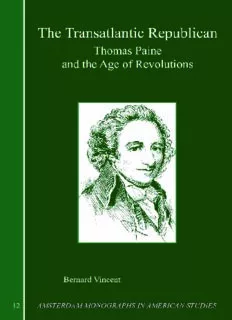
The Transatlantic Republican: Thomas Paine and the Age of Revolutions (Amsterdam Monographs in American Studies 12) PDF
Preview The Transatlantic Republican: Thomas Paine and the Age of Revolutions (Amsterdam Monographs in American Studies 12)
The Transatlantic Republican Thomas Paine and the Age of Revolutions AMSTERDAM MONOGRAPHS IN AMERICAN STUDIES 12 General Editor Rob Kroes Amerika Instituut University of Amsterdam The Transatlantic Republican Thomas Paine and the Age of Revolutions Bernard Vincent Amsterdam - New York, NY 2005 The paper on which this book is printed meets the requirements of “ISO 9706:1994, Information and documentation - Paper for documents - Requirements for permanence”. ISBN: 90-420-1614-0 ©Editions Rodopi B.V., Amsterdam - New York, NY 2005 Printed in the Netherlands Acknowledgments Various parts of this book have appeared previously in other versions, as follows: Chapter 1 originally appeared in French as “La stratégie du temps dans Common Sense,” in Autre temps, autre espace: essais sur l’Amérique pré-industrielle, ed. Élise Marienstras and Barbara Karsky (Nancy: Presses Universitaires de Nancy, 1986). Chapter 2 originally appeared as “Thomas Paine, Freemasonry and the American Revolution,” in Bulletin of the Thomas Paine Society (UK) 1 (spring 1988). Chapter 3 originally appeared as “Myth and Reality: Americans in Paris during the French Revolution,” in Les Américains et la Révolution française (Paris: Editions de la Réunion des Musées Nationaux, 1989). Chapter 4 originally appeared as “Thomas Paine and the French Revolution.,” in the Huguenot-Thomas Paine Historical Association Pamphlet (New Rochelle) (summer- fall 1989 and winter-spring 1990). Chapter 5 originally appeared in Plantation Society in the Americas 3, no. 2 (1993). Chapter 6 originally appeared as “A National Hero in Transit: The Problem of Thomas Paine's American Citizenship,” in Prospero (Rivista di culture anglo- germaniche (Trieste) 2 (1995). Chapter 7 originally appeared in Qwerty (Pau) (October 1995). Chapter 8 originally appeared as “Thomas Paine’s Agrarian Justice: A Prophecy for our Times,” in Sources (Orléans) 6 (fall 1998). Chapter 9 originally appeared in The Red Badges of Courage: Wars and Conflicts in American Culture, ed. Biancamaria Pisapia, Ugo Rubeo & Anna Scacchi (Rome: Bulzoni Editore, 1998). Chapter 11 originally appeared in Predecessors: Intellectual Lineages in American Studies, ed.. Rob Kroes (Amsterdam: VU University Press, 1999). These contributions are hereby reprinted, with minor changes, by permission of the publishers. The author wishes to express special thanks to Rob Kroes for his unremitting support and encouragement, as well as to John Goulet and Marc Niemeyer, who accepted to read the manuscript with a critical eye. This page intentionally left blank Contents Introduction Storming the “Bastille of Words”: Tom Paine’s Revolution in Writing 1 Part I. Paine, America and France I The Strategy of Time in Common Sense 21 II Thomas Paine, the Masonic Order, and the American Revolution 35 III From Fact to Myth: The Americans in Paris during the French Revolution 65 IV Paine’s “Share” in the French Revolution 85 V Thomas Paine, the Louisiana Purchase, and the Rights of Man 97 VI A National of Nowhere: The Problem of Thomas Paine’s American Citizenship 109 Part II. Paine and the Enlightenment VII Thomas Paine and the Issue of Universal Suffrage 117 VIII Paine’s Agrarian Justice and the Birth of the Welfare State 125 IX A Quaker with a Difference: Tom Paine’s Republican Rhetoric of War and Peace 137 X From the Rights of Man to the Rights of God: Thomas Paine’s Ultimate Challenge 143 XI A Pioneer with a Difference: Thomas Paine and Early ‘American Studies’ 155 Bibliography 167 Index 173 This page intentionally left blank Introduction Storming the “Bastille of Words”: Tom Paine’s Revolution in Writing Thomas Jefferson considered Thomas Paine (1737-1809) as the only man of letters of his own generation that wrote better than he did. Commenting on Common Sense, he had this remark: “No writer has exceeded Paine in ease and familiarity of style, in perspicuity of expression, happiness of elucidation, and in simple and unassuming language. In this he may be compared with Dr. Franklin, and indeed his Common Sense was, for a while, believed to have been written by Dr. Franklin.”1 Franklin himself added: “Others can rule, many can fight, but only Thomas Paine can write for us the English tongue.”2 Yet Paine would not practice art for art’s sake. Everything in him was focused on action, on the possibility of changing the established order of things. He believed in the subversive virtue and historical function of writing. His only purpose as a writer was to help public opinion evolve, convinced as he was that a change in the minds of people would sooner or later result in a transformation of society. Such was, to a large extent, the destiny of his first pamphlet Common Sense, whose outright plea in favor of independence brought about “a wonderful change . . . in the minds of men” (George Washington) 3, and was even deemed by General Charles Lee powerful enough, “in concurrence with the transcendent folly and wickedness of the [English] ministry,” to give “the ‘coup-de-grace’ to Great Britain.” 4 Similarly, when the French Revolution broke out, Paine viewed the event as the result of what pre-Revolutionary authors had prophetically expressed in their writings. As he put it in Rights of 1 Andrew A. Lipscomb, ed., The Writings of Thomas Jefferson (Washington, 1903- 1907), 15: 305. 2 Quoted in Bulletin of Thomas Paine Friends 4, no. 3 (August 2003): 3. 3 Jared Sparks, ed., The Writings of George Washington (Boston, 1833-37), 3: 347. 4 Jared Sparks, ed., The Diplomatic Correspondence of the American Revolution (Boston, 1829–30), 1: 136.
Description: